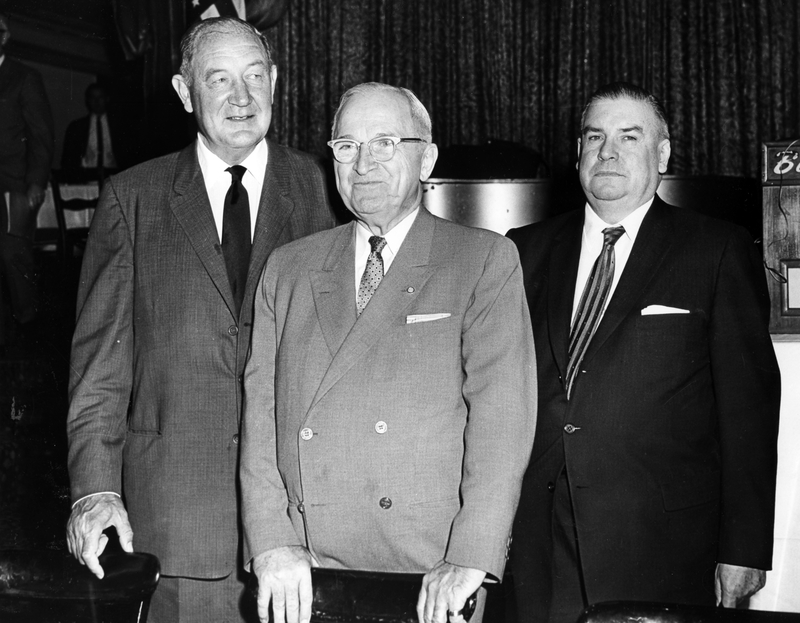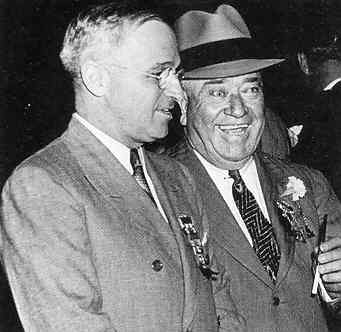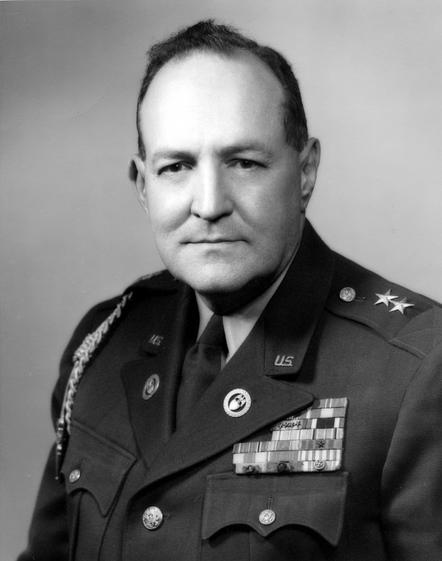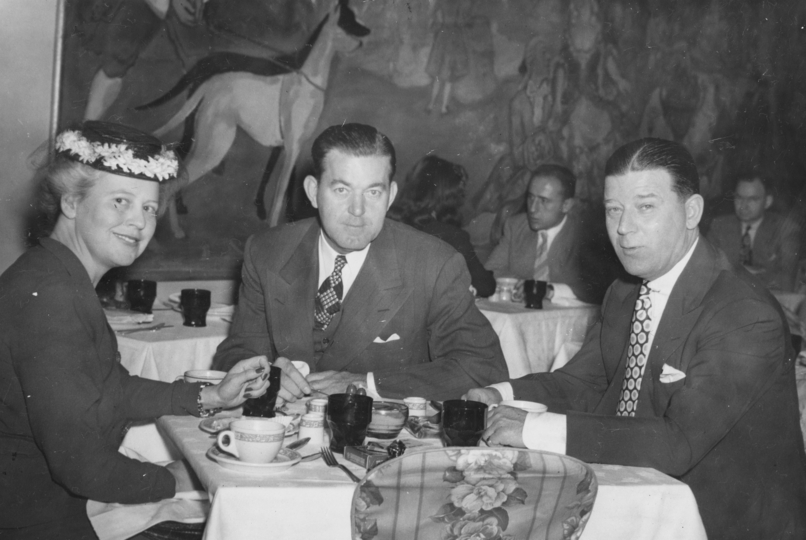There was widespread misconduct in Harry Truman’s administration, but historians discount the president's responsibility.
-
February/March 2021
Volume66Issue2
Harry S. Truman became president of a country much changed from the pre-war America of Franklin D. Roosevelt. Relative prosperity born of war had replaced depression, and government had turned its attention from combatting hardship to underwriting an immense military enterprise. In the aftermath of war, leftover property, ready money, and improvised policies offered opportunity for personal gain at public expense.
Such opportunity had an unfortunate effect on official behavior. Whatever his achievements in other fields, President Truman was unable to enforce high standards of conduct throughout his administration, nor did he invariably select appointees capable of observing high standards. As Truman’s time in office lengthened, their indiscretions came increasingly into public view and provided the opposition with ammunition for its 1952 election-year charge that there was a “mess in Washington.” That there was a mess, to the extent that misconduct extended to several agencies and touched the White House itself, is indisputable; what has remained in dispute is the effectiveness of the president’s responses.

In general, neither contemporary commentators nor historians of the Truman administration have found that the president met such failings with alacrity, or that he met fully his responsibility for setting the administration standards." The only work devoted entirely to the scandals goes even further in suggesting that there was "a general conspiracy to obstruct justice.” However, it does not elaborate on the operation of such a conspiracy, and the possibility of its existence is not supported elsewhere.”
Alonzo L. Hamby, though highly critical of Truman, also makes the reasonable suggestion that the president's attitude changed as his perception broadened. He points to Truman's changed attitude between 1951 and 1952 on the need to force disclosure of government officials' incomes. Hamby credits Truman with making sound institutional reforms, but he condemns him for creating "an impression of White House complacency which obscured the practical constructive steps he was taking."
Indeed, Hamby hints that perhaps Truman, despite his background in machine politics, may have been relatively uneducated in the types of misconduct possible in his postwar government, and that the tardiness of his responses was a product of the slowness of his education.
While this education was taking place, there occurred misconduct on a scale that may not have harmed the functioning of the government in most fields of policy, but certainly shook the confidence of the public in the executive branch and the president himself. The ultimate toll in his official family was heavy: a secretary who went to jail for deeds committed in the White House; two White House aides censured for persistent intervention in matters beyond their legitimate responsibilities; an assistant attorney general fired and later tried and jailed; a commissioner of internal revenue appointed by Roosevelt and held over by Truman jailed for lawbreaking while in office; many lower-level tax officials removed and tried for various offenses.
President Truman has not been found directly to have ordered or otherwise to have caused any of these transgressions. Yet many of them clearly took place in circumstances in which the transgressor gave the impression that the power of the President was behind him. The loyalty he gave so unstintingly to his associates was not always returned in the same measure.
The Pauley Nomination
The most controversial episode involving ethical standards in the early Truman administration centered not on overtly illegal activity but on a political “deal.” When Truman nominated Edwin W. Pauley, former treasurer of the Democratic National Committee, for undersecretary of the Navy early in 1946, there were charges that Pauley’s closeness to the oil industry made him unsuited for the post, which could involve administering naval oil reserves, a function that caused such controversy in the Harding administration.
Pauley, himself a former oil producer, had been active during the war in the campaign to frustrate the federal claim to underwater (“tidelands”) oil fields; the campaign was opposed by the Department of the Interior, which sought to establish the federal claims in the courts. During the hearings on Pauley’s nomination, Secretary of the Interior Harold L. Ickes, who as “Honest Harold” personified the integrity of New Deal progressives, accused Pauley of trying to forestall his department’s filing of a tidelands suit in order to salvage political contributions from oil interests.
The president responded with tactics that soon became familiar in his administration: he supported the man while taking action against his policy. At the time of the nomination, Truman had already disapproved of a congressional resolution supporting the claims of the states; Pauley had lobbied for its passage.

Nor did the president waver thereafter in his support of federal ownership. But neither did he waver in his support of Pauley. He answered Ickes by suggesting that the Secretary had been mistaken; Ickes resigned with a letter that not only challenged Truman’s truthfulness but warned him of the danger of a Teapot Dome-like scandal. Truman accepted the resignation and stood by Pauley until, with little hope of receiving confirmation, Pauley withdrew his name.
The Kansas City Election Inquiry
Truman was vulnerable to more serious allegations after he intervened in August, 1946, in the politics of his home state. In an effort to rid Missouri’s Fifth Congressional District, in Kansas City, of an unfriendly congressman, the President endorsed Enos Axtell and enlisted the old Pendergast Democratic political organization in Axtell’s behalf against Representative Roger S. Slaughter. In the voting in the Democratic primary on August 6, Axtell carried four Kansas City wards in which the Pendergast organization was dominant, by a ratio of 5 to 1, and thereby won a narrow victory in the district. (He was defeated by a Republican in November.) An immediate investigation by the Kansas City Star produced evidence of voting improprieties.
The U.S. Department of Justice gradually became involved in the case. The Federal Bureau of Investigation had received word of possible frauds only eight days after the primary, but the department did not institute an investigation until October 16 after the Star had published its findings. Even then, the inquiry was limited to interviews with Star reporters. On January 6, 1947, the Justice Department, having found no basis for grand-jury action, declared the case closed.
But there were repercussions. Spurred by Senator James P. Kem, Republican of Missouri, a committee of the Eightieth Congress undertook an inquiry in the spring of 1947. However, on the day before public hearings began, the ballots and other records of the primary disappeared from the vaults of the Kansas City Board of Elections. Two federal grand juries, sitting later in the year in Kansas City, handed up a total of twenty-four indictments, but convictions were almost impossible without the records.
Suspicion lingered concerning the role of the Justice Department. The 1947 investigating committee narrowly rejected an investigation of the part played by Attorney General Tom C. Clark, and the minority criticized him for representing inaccurately to the committee the nature of the original investigation. As was conceded much later by Theron Lamar Caudle, assistant attorney general in charge of the criminal division, the FBI effort had been carefully limited and had received “top-level attention.”
A member of a House subcommittee investigating the Department of Justice in 1952 charged further that Clark had removed reports on the primary from the FBI files for two years, until 1949. That same subcommittee noted that Justice Department officials who were involved in the case “fared unusually well in their subsequent careers.” Most notably, Caudle was moved to a more desirable post in the tax division. It is almost impossible to determine, however, to what extent such advancement was a reward, or what role, if any, the White House played in either the investigation or the promotions.

General Vaughan and “5-Percenters”
The President was even more seriously embarrassed by the continuing activities of his military aide, Brigadier General Harry H. Vaughan, a Missourian who had served on Truman’s senatorial staff. Even in Truman’s first weeks in the White House, Vaughan resumed the kinds of “referrals” he said had been part of his earlier job. On May 1, 1945, he wrote a note on White House stationery to obtain a wartime travel priority for a perfume manufacturer. That summer he secured Air Transport Command space for John F. Maragon of Kansas City, who was caught on his return from Europe in attempting to smuggle perfume raw materials. Nonetheless, Vaughan successfully recommended Maragon that fall for a position with an American mission to Greece.
Vaughan was the key participant as well in the celebrated incident that made “deep freeze” a symbol of corruption in the Truman administration. As Vaughan described the matter: “In 1945 I had a talk with two old friends of mine—Mr. Harry Hoffman and Mr. David Bennett. The subject of deep-freeze units came up, and I said that I would like one for my house and that I would also like to send one to the Little White House in Independence [the Truman residence in Missouri].” Hoffman, a Milwaukee manufacturer, sent not merely a freezer for Vaughan and for Mrs. Truman but four more for other members of the administration—John W. Snyder, federal loan administrator; Fred Vinson, Secretary of the Treasury; and James K. Vardaman and Matthew Connelly of the White House staff. Only Vinson sent his back.
Another incident that earned Vaughan notoriety was his effort to assist Tanforan racetrack, a California enterprise controlled by gambling interests. By exerting heavy pressure on the housing expediter, Vaughan cleared the way for Tanforan to receive an allocation of $150,000 worth of scarce building materials. The columnist Drew Pearson, who sought to find the reason for the allocation, was unable to obtain the facts, and concluded later that Vaughan had contrived to keep the matter secret.
Until mid-1949 Vaughan’s activities had been carried on largely in secret, but a wave of revelations exposed not only his efforts but a far larger game that one observer called “How to Get Rich in Washington.” The object was the peddling of influence — the sale of contacts in the government by numerous free-lance agents who came to be known, from their customary fee, as “5-percenters.”
The story surfaced with charges by a New England furniture manufacturer, aired in the New York Herald Tribune, that he had bought the influence of one James V. Hunt, a paid consultant to the War Assets Administration, who worked through General Alden H. Waitt of the Army Chemical Corps, Quartermaster General Herman Feldman, and General Vaughan.
In short order, an inquiry under Senator Clyde R. Hoey, Democrat of North Carolina, got under way. Hearings in August and September, 1949, and a committee report on January 18, 1950, produced not only a perjury conviction for John Maragon, but severe criticism of Vaughan for making Maragon’s “fixing” operations possible. Yet in none of his activities, save that of the freezers, was Vaughan accused of accepting personal payment, although it was alleged that he collected political contributions.
For his part, President Truman refused to criticize, much less rid himself of, General Vaughan. In his news conference of August 18, 1949, he specifically declined to discuss the Hoey investigation and suggested to reporters that they “suspend judgment on General Vaughan until he has been heard by the committee.”
Even after the committee had chastised Vaughan, Truman did not publicly discipline him; in fact, the general remained in the White House to the end of the Truman administration. Nor did the administration undertake major reforms as a result of the 5-percenter investigation, beyond a hasty announcement by the Department of Defense that it had altered procurement procedures to permit business people to deal directly with the Pentagon without intermediaries.
The Bureau of Internal Revenue Allegations
The expansion of federal tax collections in the war and postwar years offered an even more fertile field for those seeking special favors from the government, or those willing to dispense them. During the Truman administration, the Bureau of Internal Revenue was collecting taxes at eight times the prewar level. But the bureau’s organization was antiquated and ill-adapted to such a load; much responsibility was dispersed among sixty-four district collectors who were customarily political appointees.
The commissioner of internal revenue himself usually had political ties: Robert Hannegan, named commissioner in 1943, became Democratic national chairman and Truman’s first postmaster general. Joseph D. Nunan, his successor, was a New York legislator who had joined the bureau after failing of reelection. Nunan’s successor was George D. Schoeneman, who had preceded Donald Dawson in the patronage-clearing position of White House personnel officer.
After mid-1947 the tax division of the Justice Department, charged with prosecuting tax violations, was under Theron Lamar Caudle, who had handled the politically sensitive Kansas City election investigation. Flexible, complex tax laws, administered by officials customarily selected on bases other than their expertise, and the confidentiality afforded transactions between the bureau and the taxpayer, resulted in the most widespread and serious official misconduct of the Truman years.

The scent of scandal began to rise in 1950 as a result of the efforts of Senator John J. Williams, Republican of Delaware. An informant had told Senator Williams of irregularities in the office of the New York third district. (Unknown to Williams, Commissioner Schoeneman had already asked Secretary of the Treasury John W. Snyder to remove the district collector, James W. Johnson.) Williams asked for records of the New York office; refused, he gave his information to the Senate Finance Committee in executive session. Despite damning evidence against him—including the bribery of eight of his subordinates by taxpayers—Johnson clung to office for a year, defying both an informal presidential request and a resolution, introduced by Williams, calling for his removal.
By 1951 allegations of abuses in the Bureau of Internal Revenue brought about a congressional inquiry. The House Committee on Ways and Means established a subcommittee on administration of the internal revenue laws under the chairmanship of Representative Cecil R. King, Democrat of California; through 1951 and 1952 it uncovered illegal activity in collectors’ offices and in Washington headquarters. The investigation resulted in the removal of nine of the 64 district collectors.
Two of the nine Collectors separated from service had extorted large sums from delinquent taxpayers. Several evaded personal income taxes while in office and at least one Collector used his authority to prevent audit of his returns. The total confusion which reigned in the office of two Collectors demonstrated their incompetence as administrators…. Field investigations by this subcommittee disclosed that in a number of these offices conditions had been allowed to deteriorate as long as 16 years, because Bureau officials were unwilling to offend the politically appointed Collectors.
The most noted of these collectors was James P. Finnegan of the first Missouri (St. Louis) district, successor to Hannegan in that position and a friend of President Truman and Secretary of the Treasury Snyder. His name had come up in the Fulbright subcommittee hearings on the RFC, not only because he had associated with the Dunham-Dawson-Young circle, but because he had acted, while collector, as attorney for American Lithofold Corporation, which had paid him $45,000 for his services in unsuccessfully seeking a loan.
Finnegan’s abuses of taxpayers were revealed in 1950. An FBI informant led Commissioner Schoeneman to send investigators to St. Louis. They found that Finnegan had taken part in a racket that involved referring tax delinquents to an insurance company that split its receipts with the collector, but this investigation produced no formal charges against him. In March, 1951, a former employee complained to a federal judge in St. Louis that the district office had failed to act on tax-fraud cases that involved clients defended by lawyers with political connections. Although a grand jury brought no immediate indictments, Finnegan resigned on April 14, 1951, and the President accepted his action “with regret.”
But this was not the end of his case. Senator Williams urged Secretary Snyder to take further action and underlined his request by reading into the record the 1950 report on Finnegan by Treasury agents. The grand jury was reconvened and, despite an apparent effort by the Justice Department to hamstring the investigation, began to hand up indictments.
In October, 1951, a week after he had admitted to congressional investigators that he had taken insurance proceeds and had accepted fees from a St. Louis law firm that owed back taxes, Finnegan was indicted on two counts of bribery and three counts of misconduct in office, and found guilty in 1952 on the misconduct charges. He served eighteen months in prison in the 1950s but was pardoned, by President Lyndon B. Johnson, shortly before his death in 1967. One question concerning his departure remained unclear: had he tried to resign but stayed on at the urging of the White House, or had he resisted, as the President suggested in a subsequent news conference?
Substantial as they were—166 Internal Revenue officials fired or forced to resign in 1951 alone—the casualties of the investigation were not confined to lower levels. One former commissioner, Nunan, was exposed as a tax evader and convicted in 1954. His successor, Schoeneman, while not subject to charges of wrongdoing, nonetheless resigned effective July 31, 1951, after having failed to persuade his superior, Secretary Snyder, to take sterner measures. Charles Oliphant resigned as the bureau’s general counsel on December 4, 1951, a day after a disgruntled Chicago taxpayer had mentioned him as a member of a purported government ring attempting a half-million-dollar shakedown. Caudle, mentioned as another member of the ring, had been removed as head of the Justice Department’s tax division less than three weeks before.
Cutting even closer to the president—and, in fact, producing the only criminal charge against a member of Truman’s White House staff—was the involvement in the Internal Revenue scandals of Matthew Connelly, presidential appointments secretary. Connelly had worked for Truman on the Senate War Investigating Committee, and had been in the White House since April, 1945. In September, 1952, Caudle, testifying before the subcommittee investigating the Department of Justice, mentioned Connelly’s name in connection with the tax case of Irving Sachs of St. Louis. According to later charges, Connelly had accepted from H. J. Schwimmer, Sachs’s lawyer, a topcoat, two suits, and an oil royalty worth $7,000, for unspecified assistance; Connelly, moreover, had accepted these gratuities in 1951 and 1952 at the height of the tax investigation.
Despite Connelly’s purported aid, Sachs was convicted and fined. On December 1, 1955, Schwimmer, Caudle, and Connelly were indicted for conspiracy, and Ellis Slack, a Caudle subordinate, was named a co-conspirator but not indicted. All three were convicted. Connelly served a term of less than a year in federal prison in 1960, and was pardoned by President John F. Kennedy in 1962.
Adapted from a longer essay which originally appeared in Presidential Misconduct: From George Washington to Today, edited by James M. Banner, Jr. Published by The New Press. Reprinted here with permission.

